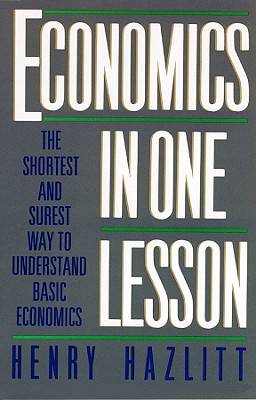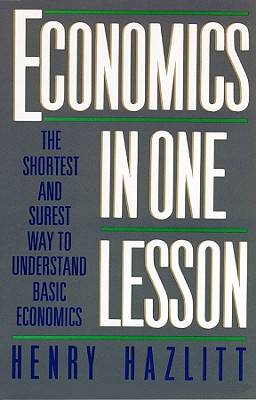
Bedankt voor het vertrouwen het afgelopen jaar! Om jou te bedanken bieden we GRATIS verzending (in België) aan op alles gedurende de hele maand januari.
- Afhalen na 1 uur in een winkel met voorraad
- In januari gratis thuislevering in België
- Ruim aanbod met 7 miljoen producten
Bedankt voor het vertrouwen het afgelopen jaar! Om jou te bedanken bieden we GRATIS verzending (in België) aan op alles gedurende de hele maand januari.
- Afhalen na 1 uur in een winkel met voorraad
- In januari gratis thuislevering in België
- Ruim aanbod met 7 miljoen producten
Zoeken
Economics in One Lesson LUISTERBOEK
The Shortest and Surest Way to Understand Basic Economics
Henry Hazlitt
CD | Engels
€ 28,95
+ 57 punten
Uitvoering
Omschrijving
A million-copy seller, Henry Hazlitt's Economics in One Lesson is a classic economic primer. But it is also much more, having become a fundamental influence on modern "libertarian" economics of the type espoused by Ron Paul and others. Called by H. L. Mencken "one of the few economists in history who could really write," Henry Hazlitt achieved lasting fame for this brilliant but concise work. In it, he explains basic truths about economics and the economic fallacies responsible for unemployment, inflation, high taxes, and recession, as well as illustrating the destructive effects of taxes, rent and price controls, inflation, trade restrictions, and minimum-wage laws. Economics in One Lesson is deceptively prescient and far-reaching in its efforts to dissemble economic fallacies that are so prevalent they have almost become a new orthodoxy. Many current economic commentators across the political spectrum have credited Hazlitt with foreseeing the collapse of the global economy, which occurred more than fifty years after the initial publication of this seminal work. Hazlitt's focus on non-governmental solutions, strong--and strongly reasoned--antideficit position, and general emphasis on free markets, economic liberty of individuals, and the dangers of government intervention make Economics in One Lesson every bit as relevant and valuable today as it has been since publication.
Specificaties
Betrokkenen
- Auteur(s):
- Uitgeverij:
Inhoud
- Aantal bladzijden:
- 6
- Taal:
- Engels
Eigenschappen
- Productcode (EAN):
- 9781433272462
- Verschijningsdatum:
- 1/04/2009
- Uitvoering:
- CD
- Formaat:
- CD standaard audioformaat
- Afmetingen:
- 132 mm x 145 mm
- Gewicht:
- 158 g

Alleen bij Standaard Boekhandel
+ 57 punten op je klantenkaart van Standaard Boekhandel
Beoordelingen
We publiceren alleen reviews die voldoen aan de voorwaarden voor reviews. Bekijk onze voorwaarden voor reviews.









